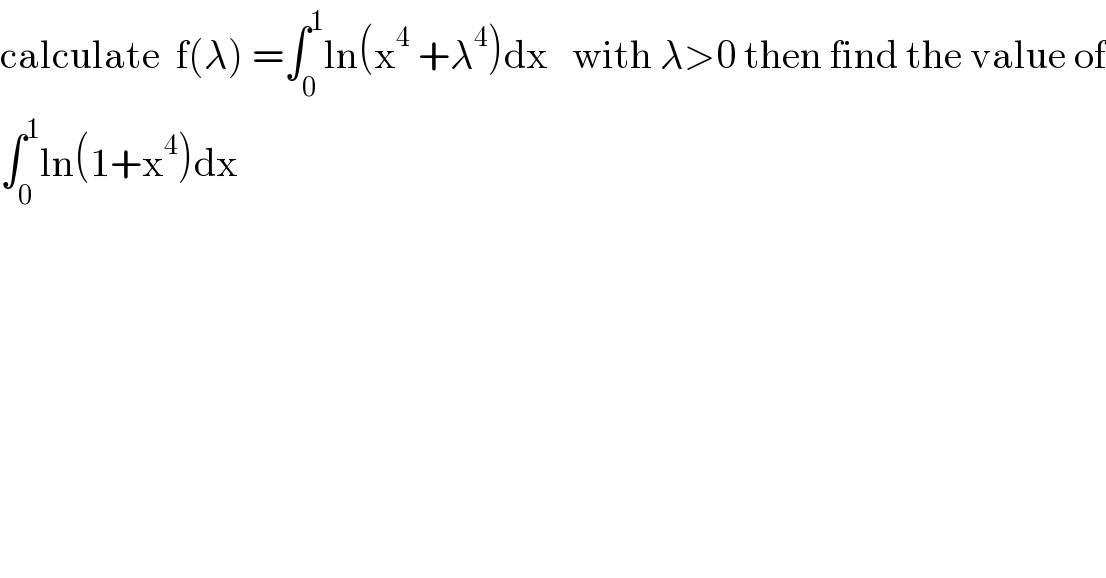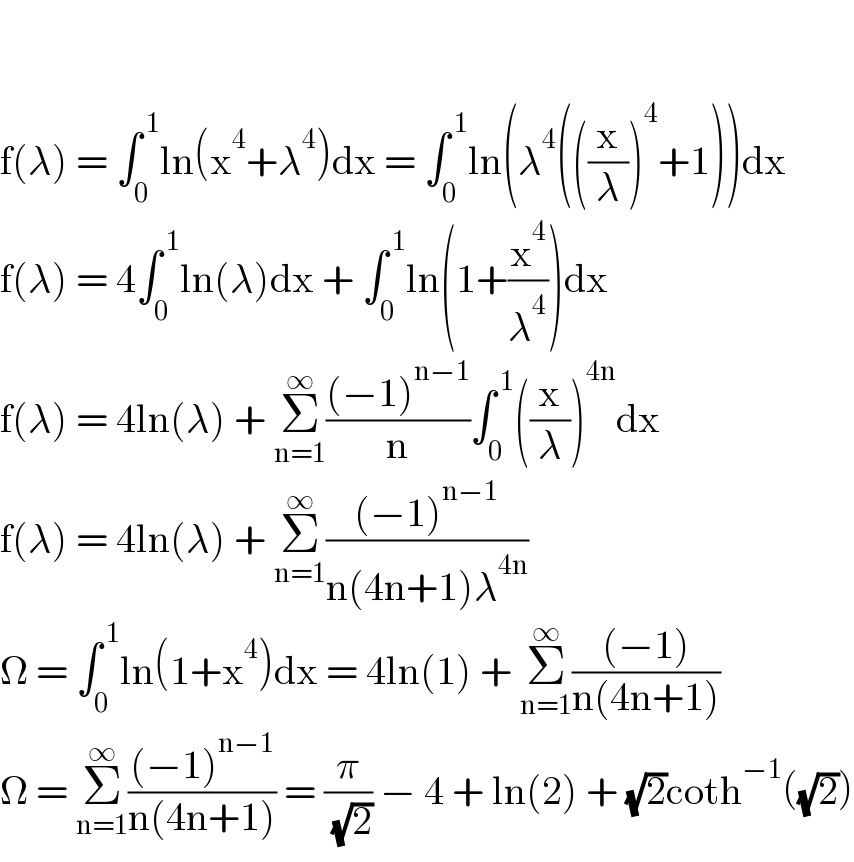
Question Number 128954 by mathmax by abdo last updated on 11/Jan/21

$$\mathrm{calculate}\:\:\mathrm{f}\left(\lambda\right)\:=\int_{\mathrm{0}} ^{\mathrm{1}} \mathrm{ln}\left(\mathrm{x}^{\mathrm{4}} \:+\lambda^{\mathrm{4}} \right)\mathrm{dx}\:\:\:\mathrm{with}\:\lambda>\mathrm{0}\:\mathrm{then}\:\mathrm{find}\:\mathrm{the}\:\mathrm{value}\:\mathrm{of} \\ $$ $$\int_{\mathrm{0}} ^{\mathrm{1}} \mathrm{ln}\left(\mathrm{1}+\mathrm{x}^{\mathrm{4}} \right)\mathrm{dx} \\ $$
Answered by Lordose last updated on 16/Jan/21

$$ \\ $$ $$ \\ $$ $$\mathrm{f}\left(\lambda\right)\:=\:\int_{\mathrm{0}} ^{\:\mathrm{1}} \mathrm{ln}\left(\mathrm{x}^{\mathrm{4}} +\lambda^{\mathrm{4}} \right)\mathrm{dx}\:=\:\int_{\mathrm{0}} ^{\:\mathrm{1}} \mathrm{ln}\left(\lambda^{\mathrm{4}} \left(\left(\frac{\mathrm{x}}{\lambda}\right)^{\mathrm{4}} +\mathrm{1}\right)\right)\mathrm{dx} \\ $$ $$\mathrm{f}\left(\lambda\right)\:=\:\mathrm{4}\int_{\mathrm{0}} ^{\:\mathrm{1}} \mathrm{ln}\left(\lambda\right)\mathrm{dx}\:+\:\int_{\mathrm{0}} ^{\:\mathrm{1}} \mathrm{ln}\left(\mathrm{1}+\frac{\mathrm{x}^{\mathrm{4}} }{\lambda^{\mathrm{4}} }\right)\mathrm{dx} \\ $$ $$\mathrm{f}\left(\lambda\right)\:=\:\mathrm{4ln}\left(\lambda\right)\:+\:\underset{\mathrm{n}=\mathrm{1}} {\overset{\infty} {\sum}}\frac{\left(−\mathrm{1}\right)^{\mathrm{n}−\mathrm{1}} }{\mathrm{n}}\int_{\mathrm{0}} ^{\:\mathrm{1}} \left(\frac{\mathrm{x}}{\lambda}\right)^{\mathrm{4n}} \mathrm{dx}\: \\ $$ $$\mathrm{f}\left(\lambda\right)\:=\:\mathrm{4ln}\left(\lambda\right)\:+\:\underset{\mathrm{n}=\mathrm{1}} {\overset{\infty} {\sum}}\frac{\left(−\mathrm{1}\right)^{\mathrm{n}−\mathrm{1}} }{\mathrm{n}\left(\mathrm{4n}+\mathrm{1}\right)\lambda^{\mathrm{4n}} } \\ $$ $$\Omega\:=\:\int_{\mathrm{0}} ^{\:\mathrm{1}} \mathrm{ln}\left(\mathrm{1}+\mathrm{x}^{\mathrm{4}} \right)\mathrm{dx}\:=\:\mathrm{4ln}\left(\mathrm{1}\right)\:+\:\underset{\mathrm{n}=\mathrm{1}} {\overset{\infty} {\sum}}\frac{\left(−\mathrm{1}\right)}{\mathrm{n}\left(\mathrm{4n}+\mathrm{1}\right)} \\ $$ $$\Omega\:=\:\underset{\mathrm{n}=\mathrm{1}} {\overset{\infty} {\sum}}\frac{\left(−\mathrm{1}\right)^{\mathrm{n}−\mathrm{1}} }{\mathrm{n}\left(\mathrm{4n}+\mathrm{1}\right)}\:=\:\frac{\pi}{\:\sqrt{\mathrm{2}}}\:−\:\mathrm{4}\:+\:\mathrm{ln}\left(\mathrm{2}\right)\:+\:\sqrt{\mathrm{2}}\mathrm{coth}^{−\mathrm{1}} \left(\sqrt{\mathrm{2}}\right) \\ $$
